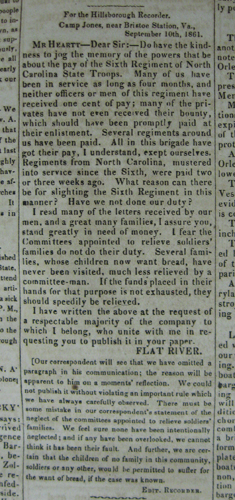6 Nov. 1783–13 May 1870

Dennis Heartt, newspaper editor and publisher, was born in North Bradford, Conn. Beyond the fact that he was the son of an English sea captain who settled in Connecticut and married a New England woman, virtually nothing is known of his childhood. At an early age Heartt was apprenticed to Ezra Read and Abel Morse, printers in New Haven. In 1802, having completed his apprenticeship, he moved to Philadelphia where he practiced his trade. He began his publishing career in May 1810 with the establishment of the Philadelphia Repertory. This paper, which concerned itself primarily with literary topics, remained in business for two years. In 1812, in Philadelphia, he issued another magazine, The Bureau; or Repository of Literature, Politics, and Intelligence. Heartt apparently continued his employment as a printer in Philadelphia until he contracted smallpox, when his physician advised him to move south.
In seeking a better climate, Heartt chose to settle in Hillsborough, N.C., where, in February 1820, he began publication of the Hillsborough Recorder. In doing so he filled a void, as there was at that time no newspaper published west of Raleigh. He continued to publish and edit this paper for nearly fifty years. He sold the Recorder in 1869 shortly before his death.
As a pioneer newspaper publisher, Heartt saw many newspapers come and go. The Recorder meanwhile became a staple in the lives of readers in Orange and adjacent counties. Heartt's paper was a source of news and opinions for and about the political leaders of North Carolina, who were situated in surprising numbers in Hillsborough and its vicinity. It provided practical suggestions for farmers and housewives. Its pages also reflected Heartt's literary interests, as it included efforts of local talent and contributions copied from other journals. Along this same literary bent, in 1845 Heartt published an edition of poems by the enslaved poet, George Moses Horton.
During his long career Heartt trained numerous apprentices—the most notable of whom was William Woods Holden, who became a well-known newspaperman and governor of the state. In 1837, Heartt gave impetus to improving the press of North Carolina by initiating a movement that led to an editorial convention of thirteen North Carolina editors. This convention, which met in Raleigh, adopted a series of resolutions to improve the standards of newspapers in the state.
In politics Heartt was a Whig, and he championed the party's candidates and programs in his columns, though with a restraint unusual for the papers of the day. He was a charter member and secretary of the Hillsborough Literary Association, which he helped organize in 1842. A Presbyterian, he served as an officer in the Hillsborough church for a number of years.
In 1804, while residing in Philadelphia, Heartt married Elizabeth Shinn, a Quaker. They were the parents of four children: Leo, Edwin, Caroline, and Henrietta. Heartt died in Hillsborough, and his funeral was held in the Presbyterian Church. The location of his burial place is unknown.